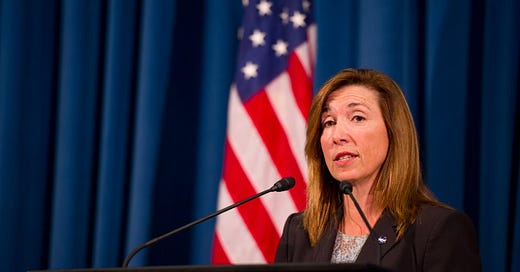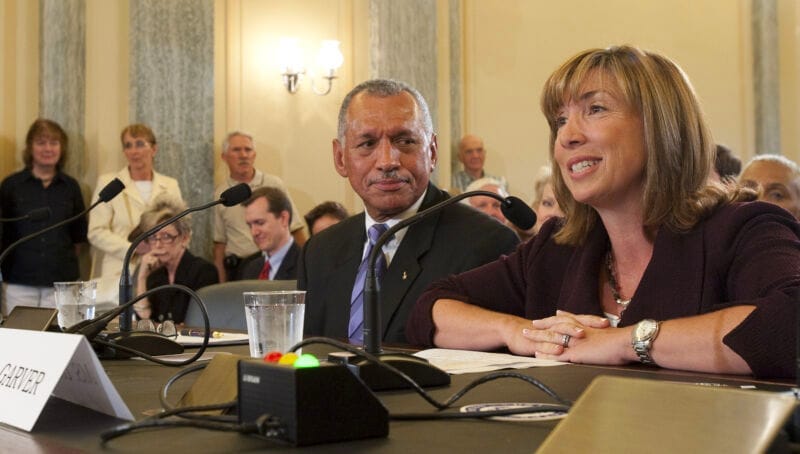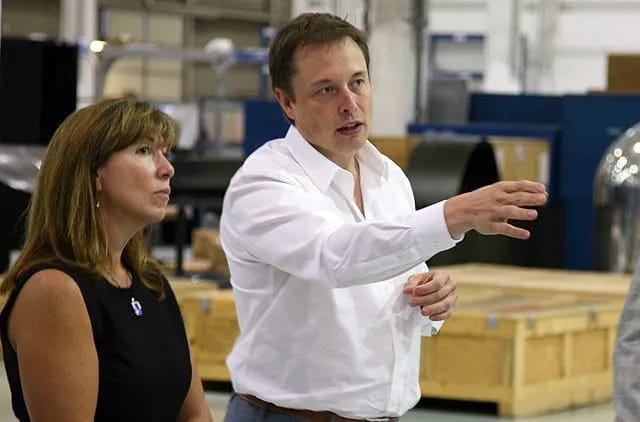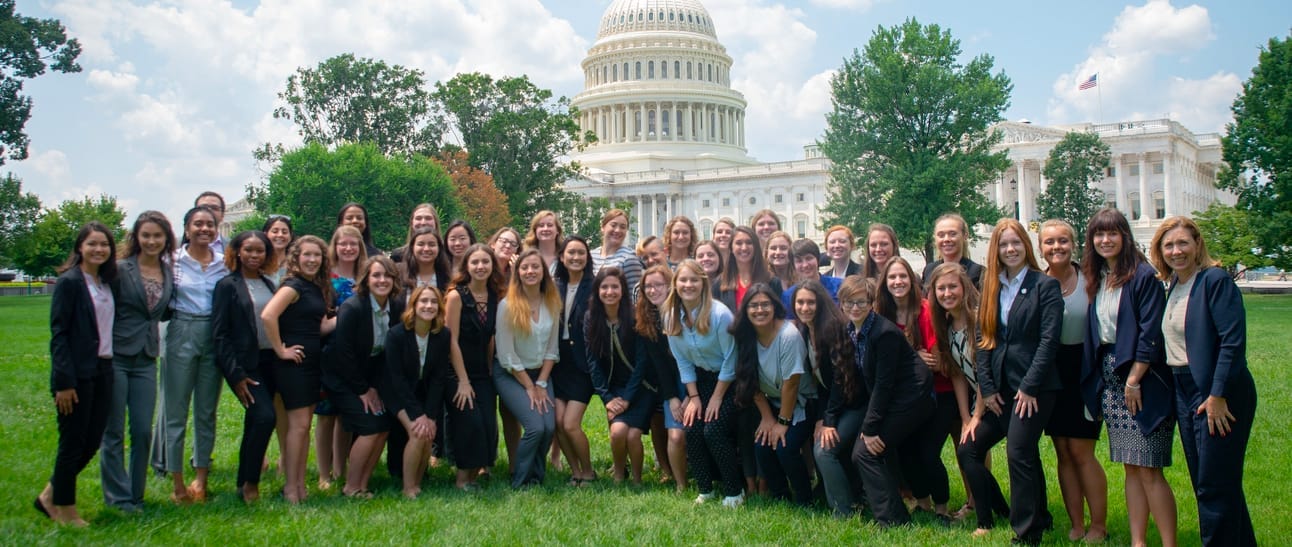Today I have the privilege to share an interview with someone who has had an immense impact on the space industry, Lori Garver. Garver is most well known for her time as NASA Deputy Administrator from 2009 to 2013 and her career is deeply woven into the success of commercial spaceflight over the last two decades.
Former NASA Deputy Administrator Lori Garver in 2012 during her time at NASA
It’s not a huge stretch to say that without Garver in her role at NASA, there would not be anything like the commercial space industry that we know today.
She was maybe the key player in the survival and sustainment of NASA’s commercial cargo and commercial crew programs. Without her, those programs would likely have been defunded in their infancy, through efforts orchestrated by legacy space stakeholders. Furthermore, without the sustained support of those programs from NASA and the opportunities they provided, SpaceX would likely have run out of capital, ending the company’s efforts before its first Falcon 9 flight.
Consequently, without Garver in the NASA Deputy Administrator role, it’s probable that the US would not be flying human-rated launch vehicles or capsules since the retirement of the Space Shuttle in 2011. That would have meant, amongst many other consequences, that the US would currently be dependent on Russian rockets for sending astronauts to the International Space Station.
If this story is at all interesting to you, I can’t recommend enough her book Escaping Gravity, published in 2022, which is part autobiography, part tell-all of her time in the space industry and at NASA.
Lori is a role model to many whose careers involve the opportunity to work on commercial space-related projects, including myself.
Your career has focused largely on the transition of the government from building its own launch vehicles toward purchasing launch services. What other key space products or services do you think make the most sense for the government to start purchasing commercially rather than building internally?
I love this question because it sort of gets at the issue that not every program needs the same type of procurement mechanism. In my entire career, launch vehicles had been something that we were working on to get the costs down. There were other customers for launch besides NASA, like commercial customers and other governments. So that diverse customer base made that transition for launch ripe for at least a decade.
We had been doing that in other areas and still are, where I think it's very helpful. For example, buying communications data for the military has been a huge benefit. Same with remote sensing data. Those are areas where I would expect to grow as companies can develop things that have markets beyond the government. Beyond that, even where it's repeatable and there's a technology that you can scope because it's mature, those make sense.
When I was at NASA, on the International Space Station we purchased drinkable water as a service. We didn’t pay to have the water purification recycling system set up because we had an agreement to buy the drinkable fluids. That wasn’t talked about much, but I’m sure it still exists on the ISS. And you could certainly imagine that as the Low Earth Orbit (LEO) economy grows, there’s a continued market for the purification and recycling of water. So we felt that we could help incentivize that development by saying, “We'll, purchase that first.”
I guess I still am a bit questioning some of the lunar activities that we are thinking are commercial, when we at NASA are the only customer in the foreseeable future.
I am more bullish on the commercial LEO market. I think for the LEO commercial destinations that will come after the end of the Space Station, that is where I would like to see NASA leverage more money. Because we know that there are not only tourists but also researchers who want to use those facilities as the costs come down. That will be very exciting when that happens. I think that NASA is on a great path towards that. However, because Artemis is taking so much focus, the LEO commercial destinations are maybe not getting the funding that they will need to not have a gap in human space flight.
Charles Bolden, nominee for administrator of NASA, left, and Lori Garver, nominee for deputy administrator of NASA, testify at their confirmation hearing before the Senate Commerce in 2009
Sometimes it feels like there’s a movement to purchase everything in space “as a service” and completely eliminate cost-plus contracting. Is there still a role for cost-plus contracting in the aerospace industry? If so, what conditions of a program would be appropriate to mature with a cost-plus contract?
It's very ironic to me that Administrator, Senator Nelson called cost plus contracting a plague. I do not agree. I think there are things at NASA that still will require cost-plus contracting for missions that are one-offs and there's not another customer and we don't have the technology to go and procure it in another way. For example, we look at things like Gateway that decided to go fixed cost, but they're still costing hundreds of millions more because they can argue that NASA changed requirements, which is true. So I think each program really requires NASA to consider the whole landscape about what tools are available to them and decide based on what's going to be the best value to the taxpayer.
Now, personally, I'll just add that if your goal is partly to develop an industrial base, which ours was in the Obama administration, and you know there is a competitive commercial environment, it’s possible to select things that are well suited to fixed price or service contracts. When you're developing policy at going to the Moon and Mars, we don’t necessarily have that competitive commercial environment. So we're now trying to jam those efforts into our new services way of doing things. It might work out where there is this mixed approach where you have some programs that are cost-plus and others that aren't. It’s an experiment.
In reading the book, it seemed to me that there is a trend for organizations over time to increasingly leverage the political process for winning contracts as opposed to what is supposed to be a more openly competitive process. How do we as an industry or how do organizations resist that trend?
In terms of companies avoiding too heavily on using the political process, I think there are efforts companies can make to go too far down that route. I like the question because it gets at the heart of one of the reasons I felt so strongly about championing the transition to a more entrepreneurial type of competitive process. Ideally getting out of that government system which has the wrong types of incentives. So I would encourage entrepreneurial companies to be smart about it in that sense.
I really do think SpaceX has done a terrific job of that. They did get criticism at times because they started participating more in the political process and lobbying more heavily. But it never has led them to develop the kind of standing armies of lobbyists that the major aerospace companies have. We're even seeing now Blue Origin behaving in what feels to me from the outside as some very heavy-handed directed lobbying. The kind that used to happen in the good old days and the Shelby days and so forth. They seemed to have used that for getting a second lunar lander.
I think it's pretty shameless what members will go ahead and do that is so obviously just directly for their constituents, but we have to recognize that their job is to deliver for constituents. So if we as a public and as an aerospace community don't have some sort of correcting behavior, why would they not pursue that route? Companies are also incentivized to do things that way. That is why I felt strongly and say in the book a few times, I really think it’s the administrations who have to stand up.
I know that's hard. It was hard for us in the Obama administration and we didn't always do it. You can call them out for what they are. I think over time it's more positive to have a competitive environment and that you're not focused on Washington. We interact with who we're comfortable with and it's all about incentives. So companies, new companies especially, can set policies that disincentivize this kind of thing versus what the natural tendencies are.
Garver receiving a tour of SpaceX from Elon Musk in 2010
I think in the space industry there can be a glorification of individuals with “technical” backgrounds I have often bought into myself as someone with an engineering background. And yet, throughout the book, you’re often fighting to enable innovation, opposed by those leveraging their “technical” backgrounds to discredit your perspective. How do you think about those challenges?
I think glorifying technical excellence is positive and we should absolutely do it. We just shouldn't translate their technical achievements into achievements in other areas such as management or politics or really even leadership. Technical people just like all of us, aren't good at everything. And sometimes those skills, as I point out in the book, do cause a problem when you get in a leadership position because, when you're a hammer, all you see is a nail. You are a planetary geologist, so all you want to do is landers. Well, if you're working on behalf of the public and maybe orbiters are the next thing, then that should be your focus, but if you have a particular interest in another arena where your friends also happen to work, then that can get problematic. These are wonderful skills to have and I do not have them. And I had no issue with giving major awards and props to the people that are really delivering on the technical stuff, it's incredible. Does that mean they're good at making policy? Not necessarily. We have to be able to separate that.
In your book, it was often illustrated how challenging it can be as a woman in aerospace. As a founder of the Brooke Owens fellowship, you’re facing head-on the aerospace industry’s lack of representation of female and non-binary talent. What actions or behaviors have you seen leadership in organizations take to make the organizations conducive to a more diverse set of talent?
I think the key is to be intentional and not pretend these differences don't exist. To recognize that these, often unconscious, biases are built in all of us and to try to offer programs where people do feel like they're welcome and want to belong. That's the goal of the Brooke Owens and Patty Grace Smith Fellowships. For both of those programs, I see the companies where they work and those that have the better experiences being the ones who hire a more diverse group of folks. So people don't feel that there isn't anyone there that they can really relate to. The organizations most successful at creating that environment are those that have specific programs for it and whose leadership is willing to address it when there are problems head-on.
Garver (far right) with Brooke Owens Fellows
In contrast, what actions have you seen companies attempt, maybe with positive intentions, that have been less effective or even detrimental toward making an organization more inclusive?
Well, I think in general the companies that struggle are those who believe this is something that'll take care of itself if they're just “selecting the best people”. Yes, we all fully believe we should be selecting the best people. But it is, again, often unintended biases that creep in.
Beyond that, I think when you have someone report something and nothing happens, that is a huge signal to people. We all ought to be aware that people communicate today, and people are aware of when these things happen. Yes, it can be very uncomfortable. I have had to make calls to companies on behalf of fellows who've experienced some of this. It's not an easy conversation, but I'll tell you, when you do and something changes, it can make all the difference. So companies who get into trouble because someone on their team did something, they really need to address it openly and directly as much as possible.
Is there anything else you’d like to add on this topic?
Yeah, I guess I'd say two things. For one, we’ve made a ton of progress. The reception for the Brooke Owens and Patty Grace Fellowships by the aerospace industry has been phenomenal. We have wait lists for companies that want to participate and hire people with these backgrounds. But also, we have some work to do to make sure that when we have early career people, their careers advance in a way that is equal to those who all look like the current industry leadership. So, valuing us for our differences is important to me. I frankly, did feel quite included in the industry. Women in Aerospace started within my first couple years. It was only when I got to more senior positions where my decisions had an impact on people, and that those who disagreed would use my background to say, “Oh, she's not a serious person.” In this country, and really throughout civilization, men have been seen as “the leaders”. So it's something to overcome within our industry as we grow in our careers.
At a time where the prevailing industry wisdom was that only governments could handle big challenges like putting humans in space, you had a conviction and a risk posture around what private industry could accomplish. Where do you think that conviction came from?
I think that conviction of mine grew out of decades of learning in the 1980’s from people who worked at the National Space Society, we were the product of a merger with the L5 Society. I look at testimony I made on the organization's behalf in the late 80’s and early 90’s, and it was very much aligned with this conviction. The head of NASA for 10 years, from 1992 to 2002, Dan Golden, also had this conviction. I was at NASA for six years during that period of time and it just seemed so obviously correct. The only way we were going to address the issue of cost, and the only way to really develop space is to lower the transportation costs. So it was a pretty strongly held belief. It was just challenging to implement, for a variety of reasons that I outlined in the book, because of vested interests in which we were challenging cost-plus contracts. Which is understandable that those interests would resist.
A common criticism of traditional prime contractors is of the “revolving door” in which retiring government leadership joins industry and leverages their experience or relationships to benefit a private company. More recently some New Space companies are starting to recruit former government leadership, with some prominent examples being SpaceX’s recruitment of former NASA Human Spaceflight Chief Kathey Lueders and prior to that, Bill Gerstenmaier. Do you think that transition is a natural consequence of how our nation’s public-private partnerships are structured or is it something to be pushed back against? Is there a more “right” or “wrong” way for that transition to take place?
Yeah, I believe that the revolving door is something you try to work against with policy. You have a year-long waiting period after folks leave their government positions and before they can represent a company where they were involved with acquisitions. Those are somewhat meaningless though because you can get around talking directly to your former agency when you're in your waiting period. However, I don't really know that aerospace is taking that much criticism for it.
I was surprised both at Bill Gerstenmaier and Kathy's going to such senior positions at SpaceX. But this has happened historically. Look at even someone like Tom Young who was quite senior at NASA and went to Lockheed and was president of Lockheed for many years. He never took any criticism. I don't know that Gerst has ever taken any criticism for going there. He's really in a technical role it seems, and I think he had such a positive impact on the technical side, that this was seen as a really great move by SpaceX. I think Kathy Lueders moving to SpaceX was also seen as really positive for SpaceX.
Where I found it unseemly, and I’ve named those people previously so I won’t now, is where someone was within NASA and they lobbied within the agency and on Capitol Hill for a cost-plus program to be awarded to someone. And then as soon as they got that program through, they left NASA and went to that company. It's ironic that Bill Gerstenmaier went to SpaceX because he was going to select Boeing. He wasn't someone who leaned in on SpaceX, at least during the time that I was at NASA.
Kathy was very supportive of SpaceX’s concepts and in fact was the source selection official, I believe, on the lunar lander. So that one was a little more surprising, but it doesn't have to be negative. I think the issue is if, in your government role, you are advocating for something that is directed to that company, you should really recuse yourself for probably longer than a year.
You know, there can be a really positive aspect to going in and out of the government. I have worked in industry and in government, including two tours at NASA, and I felt like my second tour, because I had worked for industry prior, I had a lot more knowledge. I was better at the job. So I would hate to say that someone has to stay in the same type of job for their whole career. It can be very beneficial. You just really have to watch what it is you're overseeing and have to be fully transparent.
Thinking about space policy: If you had a magic wand and could instantly change any law or regulation affecting NASA, what would you do?
This is tough. One thing that would be really powerful would be the ability to guarantee multi-year funding. That would be great, because these are long-term programs. That being said, I’m not critical of changes that result from elections or new administrations, since that's democracy and that's part of the process. But for multi-year programs, it can be very difficult to plan using only annual appropriations. We do things that are not smart or efficient based on annual appropriations.
Beyond that, I mean NASA's not a regulatory agency. I do believe that overall the regulatory environment needs a lot of work. I think the sharing of airspace and the issue of orbital space debris need to be addressed. I saw recently that the FCC was deemed out of order in their attempts to do something about space debris, it was considered not under their purview. My response would be, “Well then who?”. I think we all agree it needs to be done.
So some sort of process, it doesn't really matter to me where it lives, that can impact space sustainability would be important. Both that and air traffic deconfliction for launches would be really important to address.
Is there anything you would have done differently during your career?
Haha, I am so openly willing to say yes when I know others will say that they wouldn’t change a thing. I would absolutely, if I knew what I knew today, I would go back and do things differently. I love my career and I still think there are things I could have done better to advance the goals that I felt strongly about. I do get the sentiment that things worked out pretty well, so maybe, you know, it's the butterfly effect. If I changed something, I don’t know the effect that would result.
But there were a couple specific things like during the transition between Bush and Obama, when I was leading that team, I was working with Democrats on the Hill House and Senate appropriators about them initiating a review of Constellation. What I was hearing were these incredible stories of cost overruns and delays and technical problems. They were hearing them too, and they were interested in a review. I, for instance, wish I would've pursued that with them more strongly instead of what we did very quickly into the administration, which was put in the Augustine committee for review.
Because that did pit us as an administration sort of, against Congress. I think if they were responsible for reviewing things themselves and came up with the same results, we could have had a more smooth transition. That's just one example.
What are you most excited about the future of the space industry?
There are a few things I remain enthused about, including the space industry's ability to help address what is a major challenge for all humanity on this planet, climate change. I think we have a lot to offer. We already provide an unbelievable amount of data focusing on that. I think the Pew Institute just did a survey that came out on the public's interest in what NASA's priorities should be. The top two consistently have been addressing climate change and asteroid deflection. Those are still the top two. Asteroids beat out climate this year. The very bottom of these are sending people to the Moon and Mars. I mean, it's literally a huge difference of like, 60% of people think that priorities should be climate and asteroid and less than 10% believe they should be sending people to Moon and Mars. No one talks about it because the NASA people and the Hill are driving forward with their Moon and Mars efforts, but I'm really excited about helping and having the space program that I know and love, play a role in something that's going to be so impactful.
Then like a lot of people, I just can't help but be excited about Starship. If Starship works, it's going to change a lot of things. We will be able to do things in space that I have not really been thinking for a long time that we could do in my lifetime. So that is very exciting as well.







